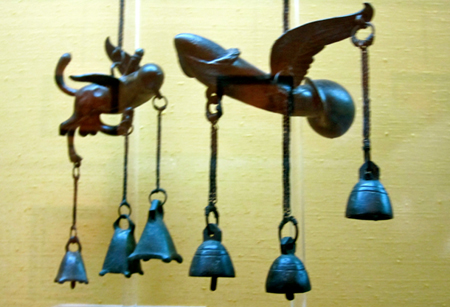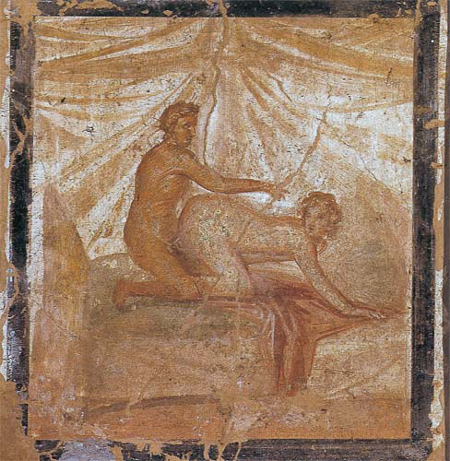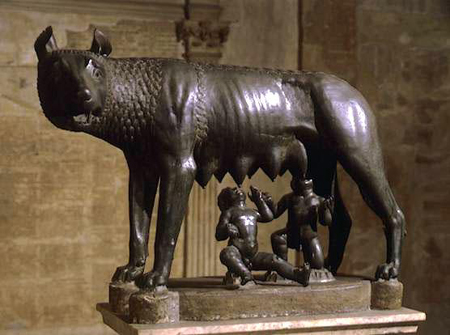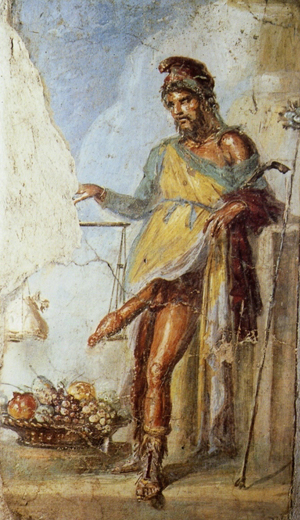An entertaining and informative
look at the background to the myth of Romulus and Remus, with flying
phalluses appearing from chimneys and sexuality in the Roman Empire; the
innumerable brothels and the Roman obsession with subjugation - of all
kinds.
Belligerent twins, Romulus and Remus are central to the myth of the
founding of Rome. However behind this myth lie others, more startling
and unearthly, with strong undercurrents of sexuality. It was the poet
Virgil who put mythology to the service of state power by inventing a
Trojan ancestry for the twins and thus the Roman people, helping to
consolidate Emperor Augustus’s power base and his claim to power. But
behind Virgil’s sycophantic genius for creating institutional myths lie
more visceral tales bound up with fertility rituals and the initiation
rites of the early Romans.The real myths are rather more extraordinary, involving flying phalluses, she-wolves, prostitutes, the god Mars and divine oracles and often had marked sexual connotations. Sex was not something to be hidden or ashamed of in ancient Rome, but sexuality was strictly managed by the state. Brothels abounded, but all in the name of political stability and a strong desire to assuage the collective anxiety regarding fertility.
The primitive cult of the erect phallus and sexual dynamism was a key element of ancient societies. Men went from being unaware of the purpose of their erections to venerating them unconditionally, once they made the reproductive connection. In every civilisation, from the very earliest, the male organ was considered to possess the power to ward off evil and increase fertility. Ancient Rome was no exception.
The earliest evidence of the cult of the phallus was found in Egypt where Isis, after the dismemberment of the body of Osiris, unable to find his penis, moulded an erect phallus to give to mankind so that they could worship it. From there, the cult of the phallus spread to Greece and then to Italy.
In ancient Rome, the phallus was not considered obscene or indecent as it is now. Plutarch, in his Life of Romulus, describes the incredible scene witnessed by Tarchetius, the cruel king of Alba Longa near Rome. One day, a huge phallus emerged from his hearth and started flying around his house. He consulted an oracle who explained to him that this was the spirit of Mars, the god of war, expressing his annoyance with him, as he was impatient to see him sire a successor to the throne.
The only way to appease the god was to offer him a virgin. The oracle told him that the child born of this union would excel in virtue, fortune and strength (rhome). Tarchetius tried to convince his daughter to have sexual relations with this huge phallus but she refused, considering it undignified, and ordered a slave girl to take her place. From this union, twins were born, Romulus and Remus, who the perfidious king ordered should be abandoned near the River Tiber so as to kill them. Miraculously the river withdrew and a she-wolf came down from the mountains and suckled them.
In order to understand sexuality in the ancient world we must also bear in mind the mentality of the Roman civis, (a fully-fledged citizen of Rome). He had the right to impose his will on his family unopposed and had been brought up in the conviction that imposing oneself on one’s enemies through military might, and on one’s fellow citizens through rhetoric was the greatest of personal achievements. Right from the earliest days of Roman civic life, the concept of being able to “overwhelm” was the supreme value, one that was applied when a man became a pater familias with the power of life and death over his wife, his children (for the duration of his life) and his slaves. A confirmation of this social power was his right to sodomize his slaves, but only “actively”: passivity in a Roman was seen as a sign of depravity and something to be punished.
Sexual passivity in a free man is a crime, for a slave a necessity, for a freed slave a duty.
Seneca, Controversiae., 4.10
To ensure greater social stability, Roman men were allowed to frequent the many brothels, the lupanari, which were to be found in every city. In Pompeii alone there were 25 of them. The brothels were dark, cramped, dirty and darkened by candle smoke. There was a catalogue describing the services available, painted as frescoes on both the internal and external walls. The “service” itself lasted no longer than a few minutes, in fact the clients did not even take off their shoes – as evidenced by the numerous imprints of shoes on the stone beds. Rudimentary contraceptive devices were used: rubbing oils, tampons soaked in lemon juice, potions and condoms made out of animal intestines.
The fee for a single “service” was 2 “asses” (coppers) which was the same as the price of a glass of wine at the time. The reason for the fee being so low was a careful political calculation; the prostitutes, the gladiatorial games and the public baths all cost very little so that every Roman could enjoy the benefits. Above all it would mean that they would be more docile and malleable, thus leading to fewer riots and uprisings. The Roman Senate knew that the serious uprisings all took place in major urban centres and in this way they did their best to prevent them from happening.
Homosexuality was considered a Greek vice and was very common, so much so that male prostitutes were far more expensive than their female “colleagues”. Homosexuality between women was considered the worst of all depravities and was severely punished.
The so-called “rigid morality” of the Romans did not prohibit prostitution at all, ensuring its status as the oldest profession on earth. Livy, in his Acca Larentia, tells us that the she-wolf who suckled Romulus and Remus was in fact a woman known as lupa, (meaning she-wolf in Latin) – a prostitute who serviced the peasant farmers. From her name comes, we are told, the word for lupanare (brothels) and perhaps the very name of Rome derives from the word ruma, a suckling breast.
The brothels were open all hours of the day and night and it was a common sight to see fathers taking their young sons there in the hope of satisfying their offspring’s primordial instincts – in order to avoid the disorder that can be caused by uncontrolled desire. Strict order and control reigned in Roman society, and anyone who went beyond its clearly defined limits was severely punished. Young boys wearing a bulla (a type of pendant), matrons, free-born men and young girls from good families could in no way be importuned, but if they were, there was a very clear law, the lex Scatinia, which punished the offender with a fine of 10,000 sesterci. Roman morality did not distinguish between the sexes, but it was highly attentive to social rank.
Prostitution was not a disgrace for those who worked in the brothels and prostitutes practised their profession of their own volition. Just as a normal citizen might choose to become a gladiator, women could become prostitutes – but this choice was tantamount to social death. Prostitutes lost the right to vote, and had to dress in a special manner, but once they had declared their intention to become a prostitute in front of the Aedile (who was in charge of public order), they could practise their profession undisturbed. If we can believe the Roman playwright Plautus, frequenting high-class prostitutes was not really advisable, even though they might offer pleasure and gratification. The downside was that they brought their patrons to psychological and financial ruin. These vampire/courtesans were central figures in Plautus’s plays.
Even in pre-Roman society the phallus was seen to have propitiatory attributes, being frequently involved in the initiation rites of young boys. On 17 March, during the feast of the Liberalia, the adulthood of young people was officially recognised and it is said that the male genitalia were openly worshipped in the name of the god Libero. A huge phallus was placed on a cart which was driven first through the countryside and then through the city where at the end of the procession it was “crowned” by a matron of the nobility. Plutarch described one of these countryside festivals.
At the head of the group, there was an amphora filled with wine, mixed with honey and a vine branch, followed by a basket of figs, followed by the virgins who carried the phallus which with the fields were irrigated.
Plutarch (De cupiditate divitiarum, VIII, 527 D)
In Lavinium, these celebrations lasted a full month, during which time obscene language was used – the worst obscenities being thought to have the power to purify and make one fertile. The use of obscene language was very important – it gave the young men the sense of virility that every true Roman citizen needed. The festival ended in the Temple of Jupiter where young boys officially enrolled for military service.
There are excesses from the past which to the modern mind may seem like picturesque rituals: such as Plutarch’s description of the falloforia organized by Ptolomey of Alexandria – a procession with celebrants carrying a 50-metre phallus covered in gold. The falloforia rite moved on to Ancient Greece where other solemn processions were held in honour of Priapus and Dionysus, in which once again large wooden phalluses were carried to ritual chanting. Surprisingly such traditions are not dead – even though the link to fertility and initiation rites may be a little hazy. Today in Japan for example, the Kanamara Matsuri (literally the festival of the erect penis) is held annually and is a lively descendant of these ancient rituals.
———————————————————————————————————————————————————–
Ludovico Pisani is an archaeologist currently studying at the University of Rome. He has worked on a variety of archaeological digs: that of Lucus Feroniae (Capena), Tor Vergata (Rome), Pyrgi (Santa Severa) and Gabii (Rome). He has also worked with the State Department of Archaeology in southern Etruria and Rome. He is currently working with the Vatican Museum.
http://www.theglobaldispatches.com/articles/sex-and-myth-in-ancient-rome





No hay comentarios:
Publicar un comentario
Nota: solo los miembros de este blog pueden publicar comentarios.